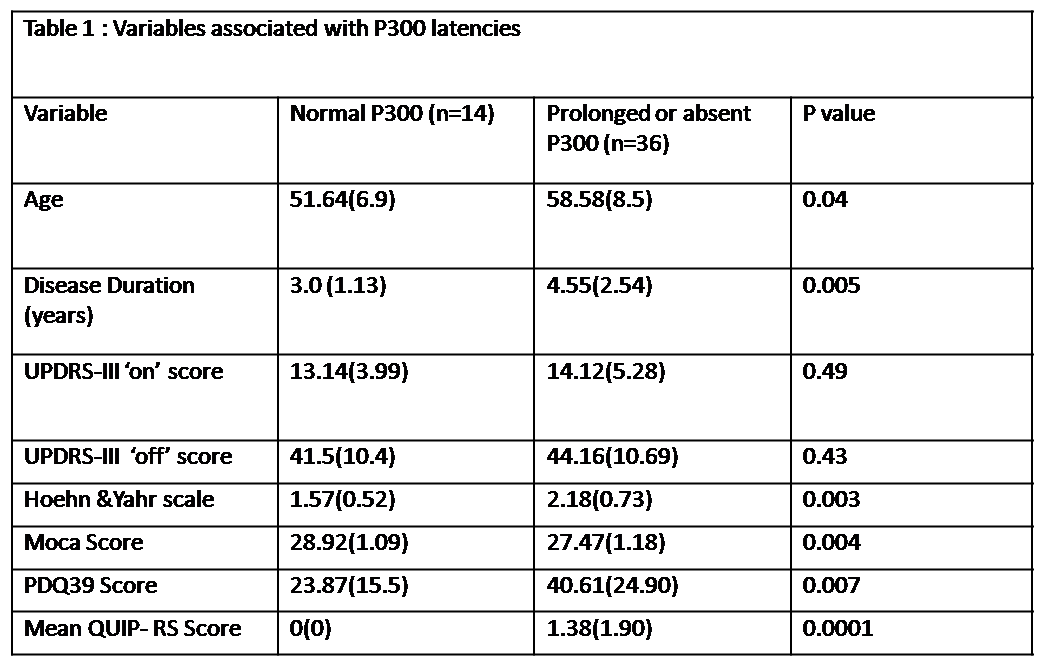Session Information
Date: Tuesday, September 24, 2019
Session Title: Neurophysiology
Session Time: 1:45pm-3:15pm
Location: Les Muses Terrace, Level 3
Objective: To evaluate prevalence of impulse control disorders in patients with Parkinson’s disease(PD), assess P300 latencies and look for any correlation between P300 latencies and impulse control disorders
Background: P300 is an endogenous, event related potential which expresses the electrical activity of the brain in decision making and control of behaviour. Impulse control disorders (ICDs) are common in PD. P300 latencies are associated with cognitive impairment in patients with PD but its association with ICDs are not clear.
Method: 50 PD patients with normal cognition (MOCA ≥26) and moderate disease H and Y score of ≤4 were recruited. After recording the demographic data and UPDRS –III scores during medication ‘On’ and ‘Off’ state, ICDs were measured using QUIP-RS score. P300 latency was measured on Natus Synergy ENMG machine using odd ball paradigm. Statistical analysis – Continuous variables were measured in mean with standard deviation. Based on normative data, the cohort was divided into two groups of normal and abnormal P300 latencies and Kruskall Wallis H test was used to assess the difference in various parameters.
Results: Among 50 PD patients, 43 were men. Mean age of the patients was 56.2+ 8.7 years.Mean disease duration was 4.1+ 0.8 years. Mean Hand Y score, UPDRS III scores in ‘off’ and ‘on’ were 2.0+0.7, 43.4+10.8, 13.8+5.0 respectively. Mean MoCA was 27.98+2.08. 14(28%) had one or more ICDs with a mean QUIP-RS score of 3.57+1.11. P300 latencies were normal in 14 (28%), prolonged in 29 (58%) and absent in 7 (14%). On comparison of the two groups with normal and abnormal P300 latencies, significantly, older age, longer disease duration, reduced MoCA, presence of ICDs, more severe stage of disease and poorer quality of life scores were associated with P300 latency abnormality.(Table 1). None of the patients with normal P300 had impulse control disorders. On multiple logistic regression analysis, significant association was found with disease duration and MoCA scores.
Conclusion: P300 latencies are easily measurable and are normal only in 28% of PD patients and abnormal in 72%. Significant association was noted with disease duration and cognition (MoCA). Impulse control disorders were noted in 28% and were absent in patients with normal P300. P300 latency may be a useful guide in assessing cognition and risk of developing ICDs in PD patients
To cite this abstract in AMA style:
R. Kandadai, R. Annakula, S. Sarva, S. Meka, T. Syed, S. Tandra, S. Turaga, R. Borgohain. Correlation of P300 parameters with cognition and impulse control disorders in patients with idiopathic Parkinson’s disease [abstract]. Mov Disord. 2019; 34 (suppl 2). https://www.mdsabstracts.org/abstract/correlation-of-p300-parameters-with-cognition-and-impulse-control-disorders-in-patients-with-idiopathic-parkinsons-disease/. Accessed February 11, 2026.« Back to 2019 International Congress
MDS Abstracts - https://www.mdsabstracts.org/abstract/correlation-of-p300-parameters-with-cognition-and-impulse-control-disorders-in-patients-with-idiopathic-parkinsons-disease/

